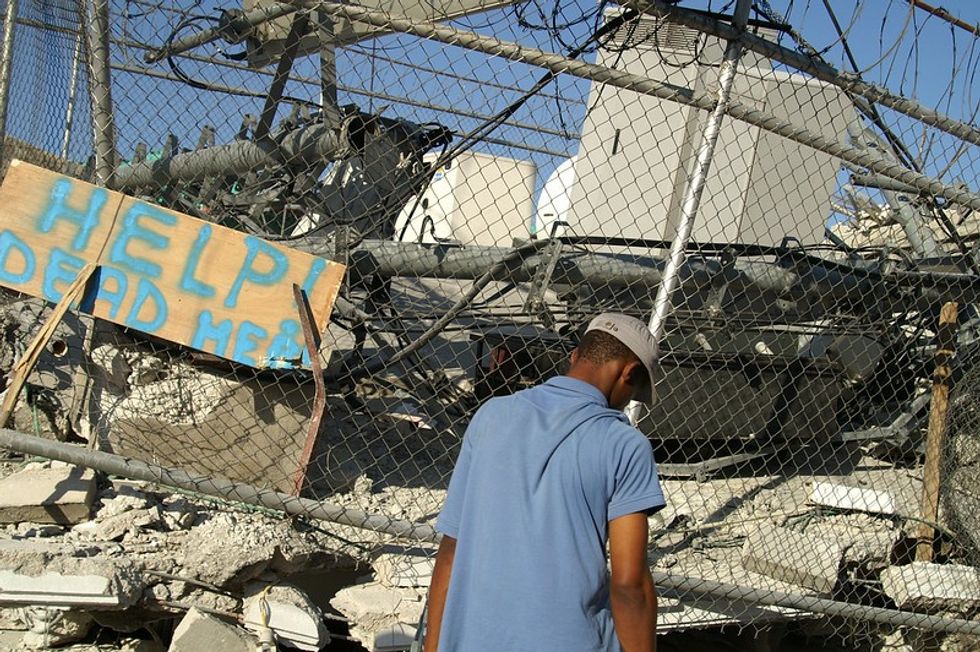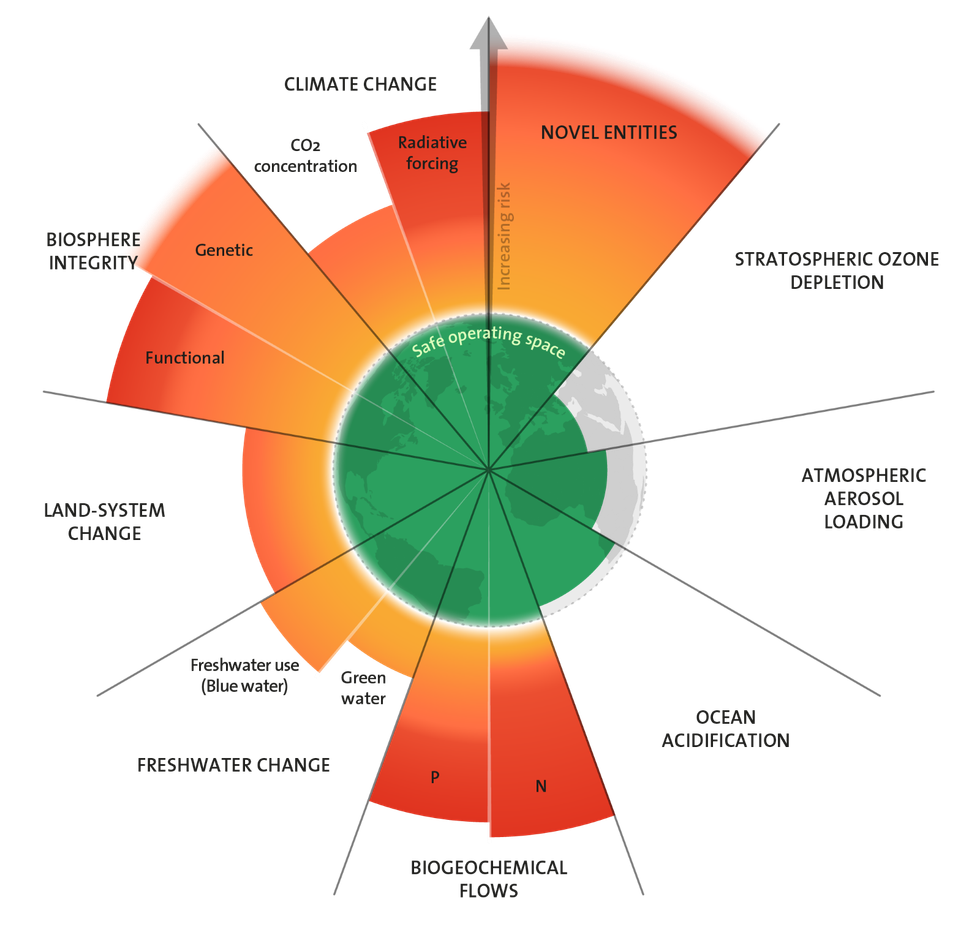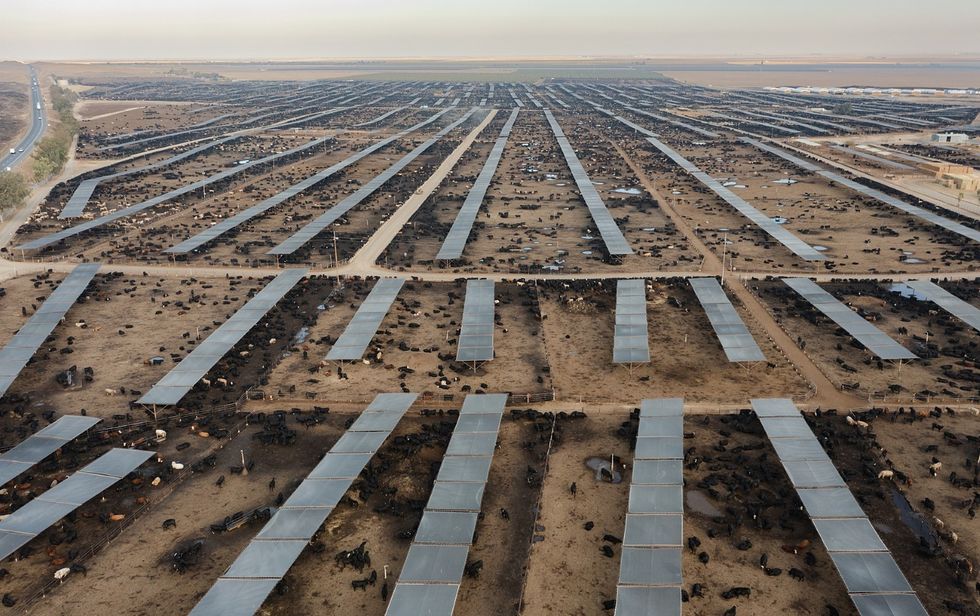

SUBSCRIBE TO OUR FREE NEWSLETTER
Daily news & progressive opinion—funded by the people, not the corporations—delivered straight to your inbox.
5
#000000
#FFFFFF
To donate by check, phone, or other method, see our More Ways to Give page.


Daily news & progressive opinion—funded by the people, not the corporations—delivered straight to your inbox.
Why does the world do less for climate the more data we have? Insights from data journalism reveal that scientists and the media have to change the way they tell the climate story.
Not even two months in office and President Donald Trump has slashed U.S. climate partnerships and aid to developing countries, notably from USAID. Expected? Yes. International anomaly? No.
Last November's COP29 conference on climate finance showed the widespread vapidity of global action. Inger Andersen, executive director of the United Nations Environment Program, revealed 1,200 notifications went out about significant gas leaks over the past two years to governments and businesses around the world. Only 1% responded. The U.N. acknowledged "capacity issues, technical barriers, and a lack of accountability," but failed to acknowledge another contributing factor. People are fundamentally not incentivized to care—because the climate crisis is consistently poorly communicated.
Publications like The New York Times typically report climate change like this: "Emissions soared to a record 57 gigatons last year." The U.N. Emissions Gap report's front page has this seething call to action: "Limit global warming to 1.5°C, struggle to adapt to 2°C, or face catastrophic consequences at 2.6°C and beyond." The media skews toward this numerical doom-and-gloom for two main reasons: One, journalists are often taught people pay attention to negative information. Two, scientists are often taught numbers speak for themselves. Logically then, numbers with negative consequences should make people care…
Instead of telling governments to fix a leak because the "data says so," we need to emphasize the positive impact on people.
No. As someone with training in data journalism and storytelling, I advise considering the underlying psychology. In 2023, a Pew Research Center survey revealed 7 in 10 Americans feel "sad about what is happening to the Earth" after seeing climate change in the news. Despite that negative frame, only about 4 in 10 Americans feel "optimistic we can address climate change" when they see news on the topic. And only about 1 in 10 Americans feel activism is "extremely or very effective at getting elected officials to act on the issue." Sadness, fear, and anxiety don't often translate to motivation.
"Climate change" and "greenhouse gases" are simply too abstract. When former U.S. President Joe Biden said climate change is an "existential threat to all of us," it felt like a hypothetical issue. When the media reduces climate change to facts and numbers—to "emissions" and "gigatons" and "degrees Celsius"—it feels like a psychologically distant entity devoid of humanity and ineligible for our care.
How then should we communicate? Maybe the solution is emphasizing the negative consequences on human beings… showing images of wildfires destroying communities and people suffering from drought. Nonprofits, for example, traditionally use negative imagery of emaciated children, often Black and brown, to get donors' attention. And many studies show this "poverty porn" works. After Haiti was severely damaged by an earthquake in 2010, for example, the negative images of victims was criticized by the media. But it led to the second biggest success in the organization's fundraising history.

These conclusions, however, lack nuance and ethics. Negative imagery may inspire pity and a donation out of guilt in the short-term. But it can lead to decreased care in the long-term. By portraying people in an undignified light, as "others" in need of "saving," we fetishize their suffering and infantilize their agency. Research demonstrates we attribute less respect and less agency to those in helpless, suffering outgroups, and are less likely to back policies that support them.
If negative data, "poverty porn," and "disaster porn" all aren't the answer, what then is? In my TEDx talk on data communication, I emphasize how emotion guides our decision-making. Research has found people gave the most money to charity after hearing simple stories that start with sadness and end on hope. Yes, negative frames do grab attention and elicit sympathy. But evidence of success emotionally inspires us to act.
Consider the U.N.'s 1% response rate to gas leak notifications. According to the executive director, "We are quite literally talking about screwing bolts tighter in some cases." Our current approach can't even get governments to screw in a bolt. If we want global leaders to keep their COP29 promise of $300 billion in annual funding for developing countries (which the U.S. certainly isn't helping with anymore), we desperately need to pivot.
Instead of telling governments to fix a leak because the "data says so," we need to emphasize the positive impact on people. How will decreasing your abstract methane emissions lead to better health for human beings? How will donating trillions to some abstract goal of "1.5°C" benefit people in your local community that you personally care about? If we want the climate crisis to be seen as not just an "existential" environmental problem, but a horrifically human one happening right now close to home, we need to stop sharing negative stats and start telling hopeful stories. Especially with staunch resistance from a second Trump administration, we need to communicate the climate crisis in a much more human and much more ethical way if we are to inspire global action.
While the developed world is rapidly changing its relationship with the rest of the world, the price of not providing climate finance will be economic losses, health impacts, increased disaster costs, food insecurity, biodiversity loss, and infrastructural damage.
The global commitment to fair climate finance is at a crossroads. COP29 concluded with a disappointing New Collective Quantified Goal on Climate Finance, or NCQG, leaving developing nations at risk of being left behind. With the U.S. withdrawing from the Paris agreement and slashing development aid, prospects for more ambitious fair climate finance are disappearing out of sight. Decisions like these not only threaten global cooperation on climate change but will also fail to meet its core purpose in supporting the most affected communities in adapting to and mitigating climate change. Now, more than ever, fair and equitable climate finance—such as increased grant-based funding and debt relief—is critical.
In Africa, the impacts of climate change are stark and undeniable. Extreme weather events on the continent surged from 85 in the 1970s to over 540 between 2010 and 2019, causing over 730,000 deaths and $38.5 billion in damages. The increasing frequency and severity of floods, droughts, and storms are threatening food security, displacing populations, and putting immense stress on water resources. According to the World Bank, climate change could push up to 118 million extremely poor people in Africa into abject poverty by 2030 as drought, floods, and extreme heat intensify. A stark reality that underscores the urgent need for robust climate finance to implement adaptation and mitigation strategies to safeguard and secure the continent's future.
Without stronger commitments to public grants and additional funding, developing countries risk falling into a cycle of debt that hinders climate action.
At the same time, climate response remains critically underfunded in Africa. From the figures released by the Climate Policy Initiative, the continent will need approximately $2.8 trillion between 2020 and 2030 to implement its Nationally Determined Contributions (NDCs) under the Paris agreement. However, current annual climate finance flows to Africa are only $30 billion, exposing a significant funding gap for climate adaptation and mitigation strategies.
COP29's main objective was to deliver on a finance goal that would see the world off the tipping point. However, after two weeks of nearly failed climate diplomacy, negotiators agreed to a disappointing $300 billion annually by 2035. This amount falls short of the $1.3 trillion per year figure, supported by the Needs Determinant Report, that many developing countries had advocated for.
Nevertheless, the Baku to Belem Roadmap has been developed to address the climate finance gap. This framework, set to be finalized at COP30 in Brazil, offers a crucial opportunity to refine finance mechanisms to effectively and equitably meet the needs of developing countries.
Beyond the insufficient funding, the NCQG lacks a strong commitment to equity, a key principle of the Paris agreement. The principle of Common but Differentiated Responsibilities (CBDR) emphasizes that developed countries should bear a greater share of the financial burden. However, the NCQG merely states that developed nations would "take the lead" in mobilizing $300 billion, reflecting a lack of firm commitment.
A major concern is the climate debt trap for developing nations. Much of the climate finance provided is in the form of loans rather than grants, worsening existing debt burdens and limiting investments in sustainable development. Without stronger commitments to public grants and additional funding, developing countries risk falling into a cycle of debt that hinders climate action.
To ensure COP29's finance outcomes do not leave the Global South behind, several actions are needed.
Firstly, debt relief is crucial. Approximately 60% of low-income countries are already in or near debt distress. Between 2016 and 2020, 72% of climate finance to developing nations was in loans, while only 26% was in grants. Reducing debt burdens would allow developing countries to allocate more resources to climate projects, improve fiscal stability, and attract additional investments.
Similarly, given the mounting climate finance debts in low-income developing countries, increased grant-based financing for climate action is needed. In 2022, developed countries provided around $115.9 billion in climate finance to developing countries, but a significant portion was in the form of loans. Heavy reliance on debt-based financing exacerbates financial burdens on these nations. Grant-based finance, on the other hand, aligns with equity principles and ensures that funding effectively supports adaptation and mitigation.
Another potential path is leveraging private sector investment. The private sector plays an essential role in climate finance. However, its involvement often prioritizes profit over genuine climate benefits. Strategies must ensure that private investments align with climate justice principles. To address this, approaches are needed such as those used by Bill and Melinda Gates.
Lastly, implementing robust governance and transparent mechanisms is critical. This includes developing detailed reporting templates, public participation in decision-making, and clear monitoring systems to track climate finance flows and prevent double counting.
While the developed world is rapidly changing its relationship with the rest of the world from aid to trade, the price of not providing equitable, grant-based, public climate finance will be economic losses, health impacts, increased disaster costs, food insecurity, biodiversity loss, and infrastructural damage. Quite simply, taking the equity conditions into account is the way forward if we are to ensure that the outcomes of COP29 leave no low-income developing nation in the Global South behind.
For agriculture as with energy, the real climate solutions are being silenced by the corporate cacophony.
I remember being filled with excitement when the Paris agreement to limit global warming to 1.5°C was adopted by nearly 200 countries at COP21. But after the curtains closed on COP29 last month—almost a decade later—my disenchantment with the event reached a new high.
As early as the 2010s, scientists from academia and the United Nations Environment Program warned that the U.S. and Europe must cut meat consumption by 50% to avoid climate disaster. Earlier COPs had mainly focused on fossil fuels, but meat and dairy corporations undoubtedly saw the writing on the wall that they too would soon come under fire.
Our food system needs to be sustainable for all—people, animals, and our planet.
Animal agriculture accounts for at least 14.5% of global greenhouse gas emissions, over quadruple the amount from global aviation. Global meat and dairy production have increased almost fivefold since the 1960s with the advent of industrialized agriculture. These factory-like systems are characterized by cramming thousands of animals into buildings or feedlots and feeding them unnatural grain diets from crops grown offsite. Even if all fossil fuel use was halted immediately, we would still exceed 1.5°C temperature rise without changing our food system, particularly our production and consumption of animal-sourced foods.
But climate change is just one of the threats we face. We have also breached five other planetary boundaries—biodiversity; land-use change; phosphorus and nitrogen cycling; freshwater use; and pollution from man-made substances such as plastics, antibiotics, and pesticides—all of which are also driven mainly by animal-sourced food production.

By the time world leaders were ready to consider our food system's impact on climate and the environment, the industrialized meat and dairy sector had already prepared its playbook to maintain the status quo. The Conference of Parties is meant to bring together the world's nations and thought leaders to address climate change. However, the event has become increasingly infiltrated by corporate interests. There were 52 delegates from the meat and dairy sector at COP29, many with country badges that gave them privileged access to diplomatic negotiations.
In this forum and others, the industry has peddled bombastic "solutions" under the guise of technology and innovation. Corporate-backed university research has lauded adding seaweed to cattle feed and turning manure lagoons the size of football fields into energy sources to reduce methane production. In Asia, companies are putting pigs in buildings over 20 stories tall, claiming the skyscrapers cut down on space and disease risks. And more recently, Bill Gates and Jeff Bezos started bankrolling research and development into vaccines that reduce the methane-causing bacteria found naturally in cows' stomachs. The industry hopes that the novelty and allure of new technologies will woo lawmakers and investors, but these "solutions" create more problems than they solve, exacerbating net greenhouse gas emissions, air and water pollution, wildlife loss, and freshwater depletion.
Emissions from animal-sourced foods can be broadly divided into four categories: ruminant fermentation (cow burps); manure; logistics (transport, packaging, processing, etc.); and land-use change, i.e., the conversion of wild spaces into pasture, feedlots, and cropland for feed. In the U.S., ruminant fermentation and manure emit more methane than natural gas and petroleum systems combined.
A new report found that beef consumption must decline by over a quarter globally by 2035 to curb methane emissions from cattle, which the industry's solutions claim to solve without needing to reduce consumption. But the direct emissions from cattle aren't the only problem—beef and dairy production is also the leading driver of deforestation, which must decline by 72% by 2035, and reforestation must rise by 115%. About 35% of habitable land is used to raise animals for food or to grow their feed (mostly corn and soy), about the size of North and South America combined.

Put simply, the inadequate solutions put forth by Big Ag cannot outpace industrialized farming's negative impacts on the planet. While seaweed and methane vaccines may address cow burps, they don't address carbon emissions from deforestation or manure emissions of nitrous oxide, a greenhouse gas over 270 times more powerful than CO2. They also don't address the nitrate water pollution from manure, which can sicken people and cause massive fish kills and harmful algal blooms; biodiversity decline from habitat loss, which has dropped 73% since the rise of industrialized animal agriculture; freshwater use, drying up rivers and accounting for over a quarter of humanity's water footprint; or pesticide use on corn and soy feed, which kills soil microorganisms that are vital to life on Earth.
Skyscrapers, while solving some land-use change, do not consider the resources and the land used to grow animal feed, which is globally about equivalent to the size of Europe. They also don't address the inherent inefficiencies with feeding grain to animals raised for food. If fed directly to people, those grains could feed almost half the world's population. And while the companies using pig skyscrapers claim they enhance biosecurity by keeping potential viruses locked inside, a system failure could spell disaster, posing a bigger threat to wildlife and even humans.
We need both a monumental shift from industrialized agriculture to regenerative systems and a dramatic shift from animal-heavy diets to diets rich in legumes, beans, vegetables, fruits, and whole grains, with meat and dairy as a specialty rather than a staple.
One solution that is gaining traction as an alternative to Big Ag's proposals is regenerative grazing. When done right, regenerative grazing eliminates the need for pesticides and leans into the natural local ecology, putting farm animals onto rotated pastures and facilitating carbon uptake into the soil. Regenerative animal agriculture is arguably the only solution put forward that addresses all six breached planetary boundaries as well as animal welfare and disease risk, and studies suggest it can improve the nutritional quality of animal-sourced foods. While it is imperative to transition from industrialized to regenerative systems, regenerative grazing comes with major caveats. This type of farming is only beneficial in small doses—cutting down centuries-old forests or filling in carbon-rich wetlands to make way for regenerative pastures would do much more climate and ecological harm than good. Soil carbon sequestration takes time and increases with vegetation and undisturbed soil, meaning that any regenerative pastures made today will never be able to capture as much carbon as the original natural landscape, especially in forests, mangroves, wetlands, and tundra. And while regenerative farmlands create better wildlife habitats than feedlots and monocultures, they still don't function like a fully natural ecosystem and food web. Also, cattle emit more methane than their native ruminant counterparts such as bison and deer.
Most notably, however, we simply don't have enough land to produce regeneratively raised animal products at the current consumption rate. Regenerative grazing requires more land than industrialized systems, sometimes two to three times more, and as mentioned the livestock industry already occupies over one-third of the world's habitable land. In all, we have much more to gain from rewilding crop- and rangeland than from turning the world into one big regenerative pasture.

All this brings us to one conclusion—the one that was made by scientists over a decade ago: We need to eat less meat. As Action Aid's Teresa Anderson noted at this year's COP, "The real answers to the climate crisis aren’t being heard over the corporate cacophony."
Scientific climate analyses over the last few years have been grim at best, and apocalyptic at worst. According to one of the latest U.N. reports, limiting global temperature rise to 1.5°C (2.7°F) requires cutting greenhouse gas (GHG) emissions by 57% by 2035, relative to 2023 emissions. However, current national policies—none of which currently include diet shifts—will achieve less than a 1% reduction by 2035. If the 54 wealthiest nations adopted sustainable healthy diets with modest amounts of animal products, they could slash their total emissions by 61%. If we also allowed the leftover land to rewild, we could sequester 30% of our global carbon budget in these nations and nearly 100% if adopted globally.
Our food system needs to be sustainable for all—people, animals, and our planet. Quick fixes and bandages will not save our planet from climate change, biodiversity loss, and pollution. We need both a monumental shift from industrialized agriculture to regenerative systems and a dramatic shift from animal-heavy diets to diets rich in legumes, beans, vegetables, fruits, and whole grains, with meat and dairy as a specialty rather than a staple. As nations draft their policies for COP30, due early this year, we need leaders to adopt real food system solutions instead of buying into the corporate cacophony.